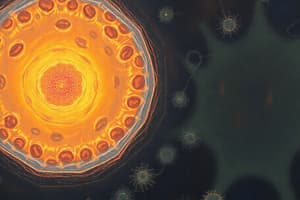Podcast
Questions and Answers
What are the major components of the Cell Theory?
What are the major components of the Cell Theory?
- All organisms are composed of one or more cells. 2. The cell is the basic unit of life in all living things. 3. All cells are produced by the division of preexisting cells.
The cell is considered the basic unit of life.
The cell is considered the basic unit of life.
True (A)
Who discovered cells in 1665?
Who discovered cells in 1665?
- Matthias Schleiden
- Robert Hooke (correct)
- Anton van Leeuwenhoek
- Rudolf Virchow
What did Anton van Leeuwenhoek call the single-celled organisms he discovered?
What did Anton van Leeuwenhoek call the single-celled organisms he discovered?
The size of most bacteria ranges from ____ microns.
The size of most bacteria ranges from ____ microns.
Match the following scientists with their contributions to cell theory:
Match the following scientists with their contributions to cell theory:
What is the primary function of mitochondria in cells?
What is the primary function of mitochondria in cells?
Eukaryotic cells contain organelles.
Eukaryotic cells contain organelles.
Which of the following is NOT a job carried out by cells?
Which of the following is NOT a job carried out by cells?
Flashcards are hidden until you start studying
Study Notes
Cell Structure and Function
- Major organelles include the cell membrane, mitochondria, lysosomes, vacuoles, and vesicles.
- Organelles are essential for cell function and overall cellular health.
Cell Theory
- Robert Hooke discovered cells in 1665 while examining cork; perceived them as tiny boxes.
- Anton van Leeuwenhoek observed single-celled organisms in 1673, termed "animalcules," and noted cells in animals.
- Matthias Schleiden (1838) declared all plant parts consist of cells; Theodor Schwann (1839) extended this to animal tissues.
- Rudolf Virchow (1858) concluded cells arise from preexisting cells.
- Components of the cell theory:
- All organisms comprise one or more cells.
- The cell is the fundamental unit of life.
- All cells originate from existing cells.
Importance of Cell Theory
- Serves as a foundation for research in disease, medical treatments, and advancements like cloning and stem cell therapy.
Types of Cells
- Prokaryotic cells lack organelles and are generally bacteria.
- Eukaryotic cells contain organelles and include both plant and animal cells.
- Cell size comparison: bacterial cells range from 1-10 microns, eukaryotic cells range from 10-100 microns.
Functions of Cells
- Essential functions include gas exchange, nutrient intake, energy production (ATP), waste removal, maintaining homeostasis, environmental response, and cellular reproduction.
Main Jobs of Cells
- Energy production: cells require energy for various activities and to clean waste produced.
- Protein synthesis: proteins facilitate cellular activities, necessitating a high quantity within cells.
- Cell division: necessary for growth, repair, and replacement of damaged or diseased cells.
Organelles as Mini-Organs
- Each organelle performs specific tasks vital to cellular operation, mirroring the function of organs in a larger organism.
- Mitochondria: primary site for ATP production, crucial for energy needs.
- Cell membrane: regulates the internal environment and facilitates communication and transportation.
- Lysosomes: responsible for waste processing and recycling within the cell.
Studying That Suits You
Use AI to generate personalized quizzes and flashcards to suit your learning preferences.




